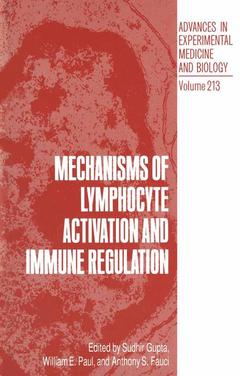Description
Mechanisms of Lymphocyte Activation and Immune Regulation, Softcover reprint of the original 1st ed. 1987
Advances in Experimental Medicine and Biology Series, Vol. 213
Authors: Gupta Sudhir, Paul William E., Fauci Anthony
Language: English
Subject for Mechanisms of Lymphocyte Activation and Immune Regulation:
Keywords
Activation; Interleukin 1; cell; gene; gene expression; leukemia; membrane; regulation
105.49 €
In Print (Delivery period: 15 days).
Add to cart
Publication date: 12-2012
337 p. · 15.6x24.4 cm · Paperback
337 p. · 15.6x24.4 cm · Paperback
Description
/li>Contents
/li>
During the past 5 years rapid progress has been made in the understanding of biochemical pathways for signal transduction in lymphocyte activation. Gene cloning technology has been instrumental in defining and making available in pure form of a number of growth and differentiation factors, in the characterization of their receptors, and in the delineation of genes for the T cell receptor. This book is divided into 6 sections. Section 1 deals with the molecular structure of the T cell receptor. Section 2 discusses the role of the T cell receptor, membrane ion channels and biochemical pathways of signal transduction in T cell activation. The molecular structures and biological and immunological effects of interleukin 1, interleukin 2 and interleukin 3 are presented in Section 3. This section also details the structure of interleukin 2 receptor and its use as a target for therapy for certain leukemias. Section 4 includes the biochemical events which occur following the delivery of the signal for B cell activation, proliferation, and differentiation by antigen, growth/differentiation factors. The molecular structure of B cell stimulating factors is also discussed. The role of oncogene expression in cellular activation and differentiation is included in Section 5. The cellular and molecular basis of natural killing and the molecular basis of cyc1osporin A-mediated immunosuppression are discussed in detail in Section 6. We hope this book will serve as a reference work on basic mechanisms of lymphocyte activation, proliferation, and differentiation for immunologists and molecular biologists.
T Cell Receptor.- The T cell receptor: Its repertoire and role in thymocyte development.- Murine T-cell receptor genes.- Correspondence between functionally significant sequences in immunoglobulin and the T cell receptor for antigen.- T Cell Activation.- The early mitogenic pathway in mouse thymocytes: An analysis of the dual signal hypothesis.- The role of the antigen receptor/T3 complex in T-cell activation.- Early events in lymphocyte activation triggered via CD3/Ti or CD2.- Human T lymphocyte activation.- Transmembrane signals in the activation of T lymphocytes.- Ion channels in T lymphocytes.- Interleukins and their Receptors.- The multiple biological properties of interleukin-1 influencing immunocompetent cells.- Autocrine growth function of interleukin-1-like molecules secreted by neoplastic human B cells.- Dissection of the molecular events occuring during T cell cycle progression.- The Interleukin-2 receptor on normal and malignant lymphocytes.- IL-2 receptor gene activation by ATL-derived factor (ADF).- Mechanisms in interleukin 3 regulated growth and differentiation.- B Lymphocyte Activation, Proliferation and Differentiation.- The activation, proliferation, and differentiation of human B lymphocytes.- Delineation of human B cell differentiation: Immunological and molecular characterization of human B cell differentiation factor (BSF-2).- Transmembrane signaling reactions generated in B cells in response to anti-IgM or lipopolysaccharide.- Coupling of B cell surface Ig, Ia and BSF1 receptors to intracellular “second messengers”.- B lymphocyte activation — The roles of receptor cross-linkage and BSF-1.- B cell growth factor interactions.- IgGl induction factor: A single molecular entity with multiple biological functions.- Inhibition of human B cellproliferation by ion channel blockers.- Proto-Oncogenes and Cellular Activation and Differentiation.- Cell growth associated regulation of c-myc and c-fos in normal human T cells.- Regulation of proto-oncogene expression during T lymphocyte activation and proliferation.- Expression of the c-fos gene during differentiation.- Natural Killing and Cyclosporin A.- Activation of natural killer (NK) cells and mechanism of their cytotoxic effects.- Regulation of activation and proliferation of human natural killer cells.- Molecular mechanism of natural killer cell-mediated cytotoxicity.- Mechanism of action of cyclosporine.- Contributors.
© 2024 LAVOISIER S.A.S.
These books may interest you

Signal Transduction Mechanisms 316.49 €



